
Get stories and expert advice on all things related to college and parenting.

Even during a “normal” year, sending a child off to college can be an anxiety-provoking experience for parents. Whether your student is attending school an hour away or on the opposite side of the country, there are always things to worry about.
We talk to our kids about binge drinking, consent and sexual assault, hazing and ride-sharing safety, just to name a few.
But the fall of 2020 will bring additional, serious concerns for parents whose kids are planning to head to college campuses that have committed to welcoming back students. Everything COVID-19 related will now likely be at the top of the list of safety concerns for most parents.
Whether you're the parent of a new or returning college student, there are action steps you can take right now to better prepare yourself and your student for campus life this fall.
Obviously, kids who are in high-risk categories for more severe effects from a COVID-19 infection should look into alternatives for living at school. Taking classes remotely should be an option, but if not perhaps taking a gap year would be prudent.
As always, make sure your student has a physical check-up with their medical professional, is up to date on all required vaccinations, and has a plan in place for how they'll access prescription medications (should they currently use any, or in case they come to need any).
A medical power of attorney form — for the state where your student will be living — can be downloaded online without needing an attorney.
However, some states do require a notary to be the signature witness, so check to be sure. Make certain that both your student and you sign up for the school’s campus safety alert system.
Collect these items and store in an easy-to-access container. Along with all the regular first-aid kit type items, this year it will also be helpful for your student to have:
Some students are comfortable with a daily check-in via text or call and some may not feel the need to communicate with a parent more than a couple times a month. Parents are typically the ones who desire more frequent communication, so it’s helpful to come up with an arrangement before your student leaves.
This year it may be particularly helpful for college roommates, whether living in a dorm or in off-campus housing, to exchange “In Case of Emergency” contact numbers for their parents or a friend or family member nearby, in the unlikely event that one gets seriously ill or can’t access their phone.
Each school will have its own rules and guidelines in place, but the fact that college students are young adults who want to connect means there will be many opportunities for your child to undertake risk-benefit analyses.
As we know, when alcohol is involved, risk-taking behaviors increase, so discussing these real-world scenarios with your student before they depart will be helpful.
Colleges are carefully working to make their spaces as safe as possible for returning students and staff members.
Yet the reality of life is that there is some amount of harmful risk involved with almost every activity that we engage in on a daily basis. The thought of your student being on a college campus this fall may give you pause, yet we need to be mindful that we take a calculated risk every time we allow them to drive away from home in a car, go swimming with friends, or step up on a ladder at their retail job.
We must acknowledge that just because a college campus will be open this fall, it will not be completely free of COVID-19, and the virus will be just another inherent risk our students will contend with. We can do our best to help educate them about how to stay healthy, how to reduce their chances of harm, and hopefully avoid the riskiest health behaviors.
After that, our job as parents is to try our best to keep our own anxiety levels down and encourage all of our family members to be flexible. Stress increases when we repeatedly focus attention on situations over which we have no control.
In the case of keeping your college student safe on campus this fall, this is what we can control: preparing them as best as possible, encouraging safe practices, and being there for them if and when they need our support.
Just like in a “normal” year.